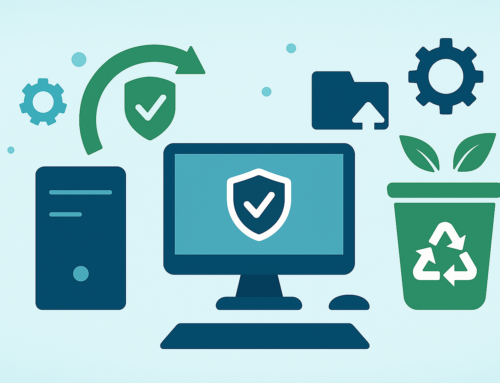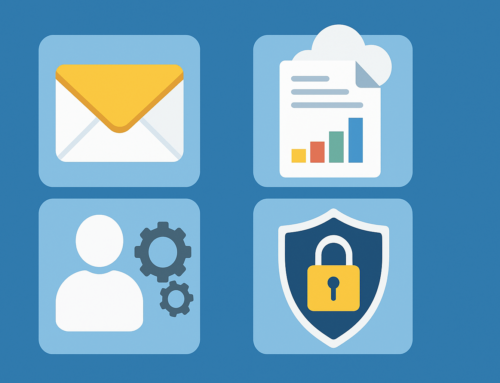How to Improve Cybersecurity for Small Businesses
Small businesses are facing more cyberattacks than ever. Protecting your business from these threats is crucial to maintaining customer trust and business continuity. Here are six ways that small businesses can improve their cybersecurity: employee training, strong password policies, regular software updates, implementing firewalls and antivirus software, securing Wi-Fi networks, and planning for data breaches.
Employee Training on Cybersecurity
One of the most effective ways to enhance your small business’s cybersecurity is by training your employees. Cybersecurity is not just a technical issue but also a human one. Employees can inadvertently become the weak link in your cybersecurity defences if they are not properly educated about common threats like phishing, malware, and social engineering attacks.
Why Is Employee Training Important?
Employees often handle sensitive information and access critical systems. Without proper training, they might fall victim to scams that compromise your business’s security. Regular training sessions can help employees recognize suspicious activities and respond appropriately.
How to Implement Effective Training
- Regular Workshops: Conduct workshops every few months to keep employees updated on the latest cybersecurity threats and best practices.
- Simulated Phishing Attacks: Test employees with simulated phishing emails to assess their awareness and improve their response.
- Clear Policies: Develop clear policies and guidelines on cybersecurity practices, ensuring all employees understand and adhere to them.
Don’t leave your business vulnerable to cyber threats. Reach out now to schedule a consultation and let us help you secure your business.
Enforcing Strong Password Policies
Passwords are the first line of defence against unauthorised access. Weak or easily guessable passwords can be a significant vulnerability.
Creating Robust Password Policies
Employees often handle sensitive information and access critical systems. Without proper training, they might fall victim to scams that compromise your business’s security. Regular training sessions can help employees recognize suspicious activities and respond appropriately.
- Complexity: Require passwords to be a mix of letters, numbers, and special characters.
- Length: Enforce a minimum password length, ideally at least 12 characters.
- Regular Changes: Mandate regular password changes, every 60-90 days.
- Multi-Factor Authentication (MFA): Implement MFA to add an extra layer of security.
Keeping Software Updated
Outdated software can have vulnerabilities that cybercriminals exploit. Regular updates and patches are essential to maintaining robust security.
Steps to Ensure Software Is Up-to-Date
- Automatic Updates: Enable automatic updates for all software, including operating systems, applications, and antivirus programs.
- Regular Audits: Perform regular audits to identify and update any outdated software.
- Patch Management: Implement a patch management system to keep track of updates and patches.
Stay ahead of cyber threats with Techfident! Our team of experts will ensure your software is always up-to-date and secure. Contact Techfident today if you have any questions or if you’d like to find out more about our services.
Implementing Firewalls and Antivirus Software
Firewalls and antivirus software are critical components of a strong cybersecurity posture. They act as barriers against unauthorised access and malware.
Setting Up Effective Firewalls and Antivirus
- Firewalls: Install and configure firewalls to monitor and control incoming and outgoing network traffic.
- Antivirus Software: Use reputable antivirus software to detect and remove malware. Ensure it is regularly updated.
- Intrusion Detection Systems (IDS): Consider using IDS to monitor for suspicious activities on your network.
Securing Wi-Fi Networks
An unsecured Wi-Fi network can be an entry point for cybercriminals. Ensuring your network is secure is crucial to protecting your business.
How to Secure Your Wi-Fi Network
- Encryption: Use strong encryption protocols like WPA3 for your Wi-Fi network.
- Hidden SSID: Hide your Wi-Fi network’s SSID to make it less visible to unauthorised users.
- Guest Networks: Set up a separate guest network for visitors to prevent them from accessing your main business network.
Planning for Data Breaches
Despite best efforts, data breaches can still occur. Having a plan in place can help mitigate damage and ensure a swift response.
Creating a Data Breach Response Plan
- Incident Response Team: Establish a team responsible for handling data breaches.
- Response Procedures: Develop and document procedures for responding to data breaches, including notification, containment, and remediation steps.
- Regular Drills: Conduct regular drills to ensure your team is prepared to respond quickly and effectively.
FAQs
What is cybersecurity, and why is it important for small businesses?
Cybersecurity involves protecting systems, networks, and data from digital attacks. For small businesses, cybersecurity is vital to protect sensitive information, maintain customer trust, and avoid financial losses.
How can small businesses afford cybersecurity measures?
While some cybersecurity measures can be costly, many are affordable and highly effective. Investing in training, strong passwords, regular updates, and basic security tools like firewalls and antivirus software can provide significant protection.
What should I do if my business experiences a cyberattack?
If your business experiences a cyberattack, immediately follow your data breach response plan. Notify your incident response team, contain the breach, notify affected parties, and work to remediate any damage.
Are there free resources available to help improve cybersecurity?
Yes, there are many free resources available, including government websites like the FCC and cybersecurity organisations like the National Institute of Standards and Technology (NIST), which offer guidelines and best practices.
How often should I update my cybersecurity measures?
Cybersecurity is an ongoing process. Regularly review and update your cybersecurity measures, conduct training sessions, and perform security audits to keep your defences strong.
Techfident: Your Partner in Cybersecurity
At Techfident, we understand the unique cybersecurity challenges faced by small businesses. Our comprehensive services include:
- Security Software: Protecting your infrastructure with essential security applications.
- Managed Services: Continuous monitoring and management of IT systems to ensure optimal performance and security.
- Professional Services: Expert consultation and support for cybersecurity measures tailored to your specific business needs.
Get in touch with Techfident for all your security software, managed services, and professional services needs. Call us on 0203 4883282 or fill out our online contact us form.




